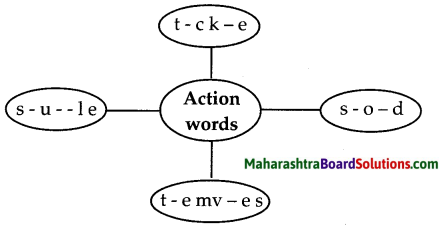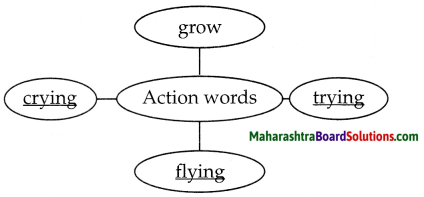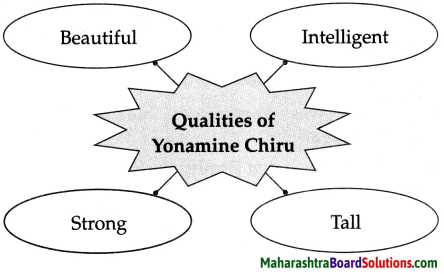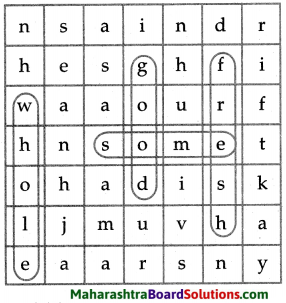Balbharti Maharashtra State Board Class 6 English Solutions Chapter 3.2 Seven Sisters Notes, Textbook Exercise Important Questions and Answers.
Std 6 English Lesson 3.2 Seven Sisters Question Answer Maharashtra Board
Class 6 English Chapter 3.2 Seven Sisters Textbook Questions and Answers
1. Present any one of the speeches given above.
Question 1.
Present any one of the speeches given above.
![]()
2. Choose any one of the Seven States. Find more information about it and prepare a leaflet or brochure to invite people to visit it.
Question 1.
Choose any one of the Seven States. Find more information about it and prepare a leaflet or brochure to invite people to visit it.
Answer:
Arunachal Pradesh
Neolithic tools found in Arunachal Pradesh indicate that people have been living in the Himalayan region for at least eleven thousand years. Arunachal Pradesh is the largest among the north-eastern states in terms of land area, even larger than Assam. It had the maximum number of regional languages in India.
English is used as the official language. Itanagar is the capital city of the state of Arunachal Pradesh. The majority of people of Arunachal Pradesh are of Tibet-Burman origin. Losar, Dree, Solung and Reh are the major festivals in the state of Arunachal Pradesh.
3. From the passage, find and write any two examples of the following.
Question a.
Use of the verb ‘be’ (am, is, are, etc.) as the main verb.
Answer:
- I am a nature lovers’ heaven.
- My people are simple and hospitable.
![]()
Question b.
Sentences containing ‘must’; ‘can’.
Answer:
Must:
- You must make it a point to visit the 400-year-old Buddhist monastery at Tawang and enjoy cultural festivals at Ziro.
- The natural beauty here is exquisite and must be seen to be believed!
Can:
- You can enjoy the panoramic view of Bangladesh from here.
- My capital is Imphal where you can see the cyclists’ velodrome.
Question c.
Sentences beginning with ‘Don’t’.
Answer:
- Don’t miss the Namdapha Tiger Project.
- Don’t forget to visit the Ahom palaces.
![]()
4. Write a short speech for the state of Maharashtra.
Question 1.
Write a short speech for the state of Maharashtra.
I am a state in the western region of India and am the second-most populous state of the world. I have more than 110 million inhabitants and my capital Mumbai has a population of approximately 18 million. Mumbai is the headquarters of all major banks, financial institutions, insurance companies and is also the financial and commercial capital of India.
I was formed on 1st May, 1960 which is celebrated as Maharashtra Day. My symbolic bird is the Yellow Footed Green Pigeon and animal is the Indian Giant Squirrel. My state is known for its mangoes. Maharashtra is symbolized by the traditional dance known as ‘Lavni’. The Rankala Lake in Kolhapur is considered to be the oldest of all lakes in my state.
![]()
Class 6 English Chapter 3.2 Seven Sisters Important Questions and Answers
Answer the following in one or two sentences.
Question 1.
What is Arunachal Pradesh known as?
Answer:
Arunachal Pradesh is known as the ‘Land of the Rising Sun – the Land of the Dawn Lit Sun7.
Question 2.
What are the limestone caves known as?
Answer:
The limestone caves are known as ‘Tapenuru7.
Question 3.
What should one not miss when one visits Arunachal Pradesh?
Answer:
One should not miss the Namdapha Tiger Project when one visits Arunachal Pradesh.
Question 4.
What is Assam also known as?
Answer:
Assam is also known as Ahom.
![]()
Question 5.
Where does Assam lie?
Answer:
Assam lies between the beautiful valleys of the Brahmaputra and Barak rivers.
Question 6.
What is awesome to behold in Assam?
Answer:
The picturesque landscape of the golden- green rice fields and landscaped tea estates is awesome to behold in Assam.
Question 7.
Name Assam’s silk fabrics which the fashion world loves.
Answer:
‘Eri’, ‘Muga’ and ‘Pat’ are the names of the silk fabrics of Assam which are loved by the fashion world.
Question 8.
Name the major festival of Assam.
Answer:
Bihu is the major festival of Assam.
Question 9.
What is Shillong called? Why?
Answer:
Shillong is called ‘Scotland’ of the East’. It is so called because of its highlands, fog and scenery.
![]()
Question 10.
Which are the wettest places on the earth?
Answer:
Cherrapunji and Mausinram are the wettest places on the earth.
Question 11.
When is the Wangala festival celebrated?
Answer:
The Wangala festival is celebrated in autumn.
Question 12.
What are the nicknames of Manipur?
Answer:
The nicknames of Manipur are Kangleipak or Sanaleibak.
Question 13.
Which game did Manipur introduce to the Europeans?
Answer:
The game of ‘polo’ was introduced to the Europeans in Manipur.
Question 14.
What does Mizoram imply?
Answer:
Mizoram implies ‘land of the hill people’ referred to as the Kukis.
![]()
Question 15.
Why do we not have many tourists in Mizoram?
Answer:
We do not have many tourists in Mizoram because travelling in Mizoram is a little difficult.
Question 16.
How was the Palak Lake believed to be created?
Answer:
The Palak Lake is believed to be created as a result of an earthquake or a flood.
Question 17.
How is the terrain of Nagaland?
Answer:
The terrain of Nagaland is mostly mountainous.
Question 18.
What is Nagaland an ideal place for?
Answer:
Nagaland is an ideal place for trekking, rock climbing and jungle camping.
Question 19.
What is Nagaland known as?
Answer:
Nagaland is known as the ‘Falcon Capital of the World’.
![]()
Question 20.
What does ‘Tripura’ mean?
Answer:
Tripura means ‘three cities’. It also means ‘near water’.
Reading Skills, Vocabulary and Grammar
Answer the following.
Question 1.
What is Nagaland also known as?
Answer:
Nagaland is also known as ‘Switzerland of the East’.
Question 2.
What makes Nagaland unimaginably beautiful?
Answer:
The exquisitely picturesque landscapes, the vibrantly colourful sunrise and sunset, lush and verdant flora make Nagaland unimaginably beautiful.
Question 3.
What is the capital of Nagaland?
Answer:
Kohima is the capital of Nagaland.
![]()
Question 4.
Which is the highest peak in Nagaland?
Answer:
The highest peak in Nagaland is Mount Saramati.
Question 5.
Who inhabits the exotic hill state, Nagaland?
Answer:
There are over 16 tribes and sub-tribes that inhabit the exotic hill state, Nagaland.
Question 6.
How are the Nagas by nature?
Answer:
Nagas are lovers of fun and frolic by nature.
Question 7.
From the extract, write two words that are combined together to form one word.
Answer:
Limitless, hombill, showcases.
Question 8.
There are over 16 tribes. (Change to simple past tense).
Answer:
There were over 16 tribes.
![]()
Question 9.
State the part of speech of the underlined words.
a. The exquisitely picturesque landscapes make my land unimaginably beautiful.
Answer:
- exquisitely, unimaginably – Adverb
- landscapes – Norm
- beautiful – Adjective
Question 10.
Write on the Art and Culture of Nagaland which you like the most.
Answer:
Nagaland is famous for the colourful and intricately designed costumes, jewellery and beads. Ethnic customs and traditions infusion with music and dance are what I like most about the art and culture of Nagaland.
Language Study:
Do as directed.
Question 1.
Assam tea is world famous! (State the kind of sentence)
Answer:
Exclamatory sentence
![]()
Question 2.
I have lovely mountains. (Name the part of speech of the underlined words)
Answer:
- lovely – Adjective
- mountains – Noun
Question 3.
I am home to a host of rare endemic plants. (Add a question tag)
Answer:
I am home to a host of rare endemic plants, aren’t I?
Question 4.
Come and visit me. (Make it negative)
Answer:
Don’t leave without visiting me.
Question 5.
We ……….. peaceful people. (Fill with the correct form of the verb ‘be’)
Answer:
We are peaceful people.
![]()
Question 6.
You come and stay with us. (Use the modal ‘must’ and rewrite.)
Answer:
You must come and stay with us.
Question 7.
Garia, Durga Puja, Buddha Poumima, Pous Sankranti, Kharchi, Bijhu, Christmas. (Arrange in alphabetical order)
Answer:
Bijhu, Buddha Pournima, Christmas, Durga Puja, Garia, Kharchi, Pous Sankranti
Question 8.
The folk dances of tribal people captivate the beholders. (Separate the Subject and Predicate)
Answer:
Subject: The folk dances of tribal people Predicate: captivate the beholders.
Question 9.
I am difficult for you to access. (Change into negative)
Answer:
I am not easy for you to access.
![]()
Question 10.
Don’t forget to visit the Ahom palaces. (Change into affirmative)
Answer:
Do remember to visit the Ahom palaces.
Writing Skills:
Question 1.
Write an essay about the state you like most.
Kerala
In the 14th Century, the state of Kerala had become a linguistically distinct region. The Sanskrit epic, Aitareya Aranyaka was the first to mention Kerala in it.
The Malayalam language was developed as a language under the Chera Empire- II. Ever since the 8th century, trade was established in Kerala with the Arabs. In the year 1498, the Portuguese started trade with this state. This was followed by the Britishers and the Dutch, who commenced the trade in the 16th century.
Kerala is known to be the first literate state in India and the first state to implement land reform bills and education reform bills The state of Kerala has a lower birth rate as compared to the other states and has the least infant mortality rate along with the maximum life expectancy.
Kerala is known as the celestial land (God’s own country) for its natural beauty. Kerala is rich in cashew, coconut, arecanut, tapioca, banana, rice, ginger, pepper, vegetable plantations and sugarcane. It is truly a paradise on earth!!!
![]()
Seven Sisters Summary in English
1. Arunachal Pradesh: Arunachal Pradesh is also known as the ‘Land of the Rising Sun’. It is rich in fauna and flora. It is famous for its delicacy called ‘momos’, and the 400-year-old Buddhist monastery. It is India’s first orchid sanctuary.
2. Assam: Assam is also known as ‘Ahom.’ Kaziranga National Park and Manas National Park are the World Heritage Sites. Assam is known for its tea plantations. Assam’s silk fabrics ‘Eri’, ‘Muga’ and ‘Pat’ are famous worldwide. Its major festival is Bihu and it has many beautiful Ahom palaces.
3. Meghalaya: Meghalaya is also called ‘Scotland of the East.’ Languages spoken there are English, Khasi, Pnar and Garo. It is rich in minerals such as coal, limestone, uranium and sillimanite. Cherrapunji/Mausinram, the wettest places on earth are located here. It comprises of the longest cave is called the Krem Liat Prah and the deepest cave called the Synrang Pamiang.
4. Manipur: Manipur is also known as ‘Kangleipak’ or ‘Sanaleibak’. Many people here speak Meetei/ Manipuri language. It has the Keibul Lamjao National Park consisting of endangered species of brow antlered deer. The ecosystem has 17 rare species of mammals and is the only floating national park of the world. The martial arts of Manipur, ‘Thang Ta’ and ‘Sarit Satak’ are worth witnessing.
5. Nagaland: Nagaland is also called the ‘Switzerland of the East’. Kohima is the capital of the mostly mountainous state. Mount Saramati is the highest peak with the height of 3,840 m orming a natural barrier between Nagaland and Burma. It is also known as the ’Falcon Capital of the World’, where the great Indian hornbill is also found.
6. Mizoram: Mizoram is also known as ‘Kukis’. Its capital is Aizawl. Palak Lake is the biggest in Mizoram and covers 30 hectares. Champhai is called ‘the fruit bowl’ of Mizoram. There are 6 wildlife sanctuaries and 2 national parks here, with ‘Mizo’ being the most widely used language.
7. Tripura: Tripura means ’3 cities’ and also means ‘near water’. Tripura has 3 distinct geographical zones. The chief rivers here are Gumti, Muhuri and Feni. Agartala is the capital of Tripura. It is famous for its eco-tourism and archaeological tourism. Here, people from all the states participate in festivals like Garia, Durga Puja, Buddha Purnima, Kharchi, Pous Sankranti, Bijhu or Christmas.
![]()
Introduction:
The lesson ‘SEVEN SISTERS’ is that which tells us about the seven Indian states of Arunachal Pradesh, Assam, Meghalaya, Manipur, Mizoram, Nagaland and Tripura that lies in the north-east of India. Sikkim is a state similar to theirs but it lies further in the north-west of India and is called the only brother of the north eastern region. The ‘seven sister states’ is also called Paradise Unexplored. The lesson gives us an insight of the beauty of India with its various cultures, cuisines and traditions. The lesson makes us feel proud of our motherland, India.
Glossary:
- distinctive (adj) – to distinguish between things
- exotic (adj) – strikingly colourful or unusual
- elegant (adj) – classy, graceful
- picturesque (adj) – lovely, beautiful
- exquisite (adj) – beautiful, delicate
- overwhelmingly (adv) – very greatly or intensely
- fascinating (adj) – attractive, captivating
- panoramic (adj) – with a wide view
- aromatic (adj) – fragrant, spicy
- amazing (adj) – surprising, stunning
- acclaimed (adj) – greatly praised, highly respected
- graceful (adj) – elegant, stylish
- serene (adj) – peaceful, calm
- splendid (adj) – brilliant, excellent
- vibrantly (adv) – lively, bright
- unimaginably (adv) – difficult to imagine
- verdant (adj) – green in colour, fresh
- robust (adj) – strong, muscular
- gorgeous (adj) – very beautiful
- ecotourism (n) – tourism directed towards unspoilt natural environments and intended to support conservation
- archaeological (adj) – science or research of archaeology
- sanctuary (n) – a place of safety, refuge or protection
6th Std English Balbharati Textbook Solutions





